In the wake of the killing of George Floyd in Minneapolis and the worldwide protests in support of the Black Lives Matter movement, chefs and long-time friends Russell Jackson and Dominique Crenn discuss racism in kitchens, how food can bring people together and the next steps to improve diversity in the food world
Russell Jackson is an African American chef and founder of restaurants Reverence in Harlem, New York, and Russell’s in Los Angeles. He is the creator of SubCulture Dining, a pioneering underground supper club spanning New York and San Francisco, and of the web show PopFoodsTV. Jackson has appeared on Iron Chef America, The Next Food Network Star and Off the Menu. He serves on the Board of Directors at WHEDco.org.
Dominique Crenn is a French chef who identifies her heritage as half European and half North African. She is the creator of restaurants Atelier Crenn and Petit Crenn, as well as Bar Crenn and Bleu Belle Farm, all in California. Crenn is a LGBT, inclusivity and sustainability activist, and author of Rebel Chef – In Search of What Matters (2020).
The killing of George Floyd and the Black Lives Matter movement
Dominique Crenn: The recent events are an incredible opportunity for people all over the world to come together against racism. Discrimination is not something new; women feel it, LGBT people feel it, transgenders feel it... Enough is enough. Now, it’s like people suddenly realised ‘oh, maybe we should join the movement’. But the Black Lives Matter movement started a long time ago. It started with colonialism and when the first African slave came to the United States in 1690. White privilege is everywhere in the world. I've been feeling it for a long time, although I was raised to never see colour.
Russell Jackson: I was raised the same way, but in the last couple of weeks I've had to reflect about my upbringing. I was shielded to many of the inequities that exist culturally and societally in my demographic, as my life was very different than those of my cousins and some of the other brothers and sisters I have now. I’ve had a lot of difficulty in coming to terms with how I was treated for the longest time without even understanding it. It was normalised for me, and still today, I have to catch myself when I’m being racially biased against and understand that it's not okay, it's not normal, it shouldn't be the status quo.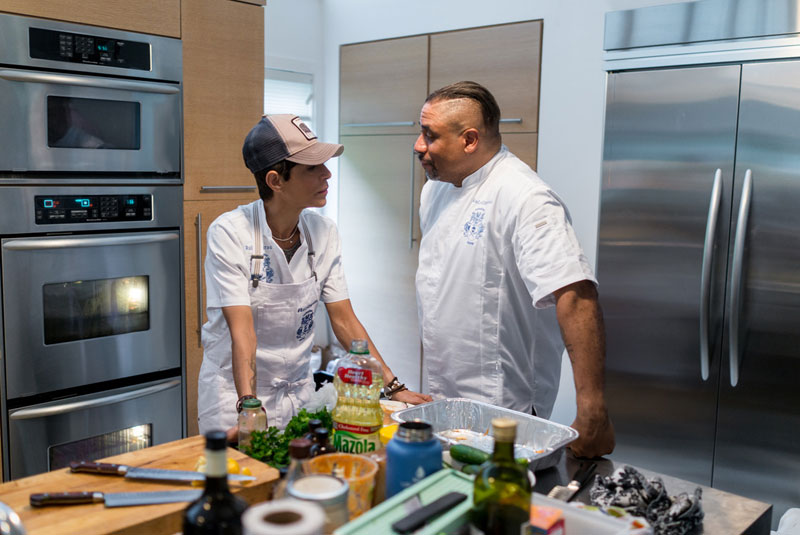
Crenn and Jackson in the kitchen
Building Reverence restaurant in Harlem and the significance for its African American community
RJ: One of the most cathartic, difficult things that I came to realise over the last few weeks is about being here in Harlem. I grew up in a Southern Californian affluent white neighbourhood. When my dad started to really make it, we moved to the Pacific Palisades in Los Angeles, where we were one of three African American families for miles. All the restaurants I had built were either in the West Side of Los Angeles or in one of the whitest neighbourhoods in San Francisco.
There was a significant disparity between what everyone else was doing in Harlem and what I felt I could do. When I looked at the demographics, there was only one Michelin-starred restaurant above 77th Street. And what's funny about is that a) it's not African American owned, and b) it's Japanese cuisine, which is wonderful, but for such an historical African American community to have no people of colour operating businesses at that level… It was so sad for me. And I said: “this has to change”. So for me to build a place in Harlem was not just important from the standpoint of being able to do something for the community, but also to realise – and this is the tough part that always chokes me up – that I needed this community more than it needed me. My hope is that the community will accept who I am and what I do.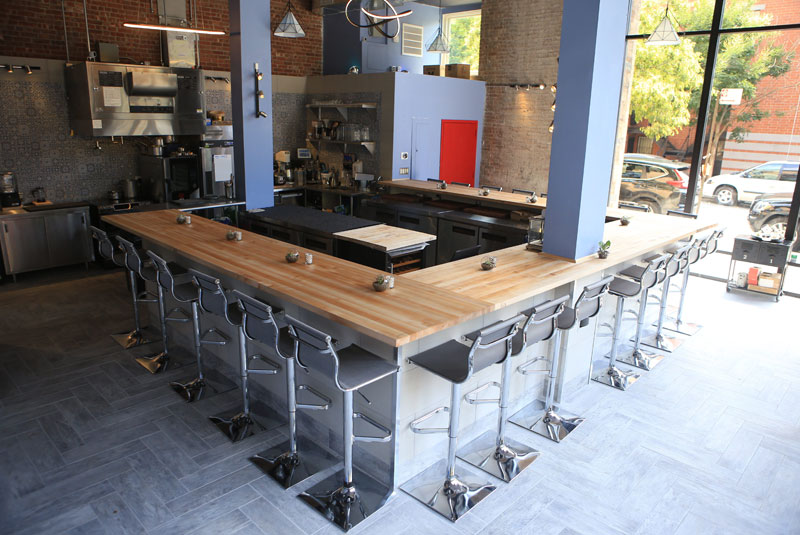
Reverence restaurant in Harlem, New York
Discrimination in the restaurant industry, food inequality and chefs’ creative freedom
RJ: In the 30+ years I've been a cook, I've been physically, mentally and emotionally abused, stabbed, burned, yelled at and paraded. Twice in my career, two big-name chefs – who are still cooking today – both hired me sight unseen. The day I walked in to start work, I was fired without ever pulling out a knife. That's one of the things where you go, “wait, what? I left another well-paying job to come here and work for you!”. It almost happened a third time, but the partner of the chef said they would get sued if they went through with it. In the majority of the upper-level kitchens I've worked in throughout my career, I was usually the only African American cook.
DC: In 2009, when I was opening Atelier Crenn, I did this interview with a women’s magazine. They wanted me to do a photo shoot and look like a housewife. I was really confused about it, so they did my hair and all that, and I was just so ashamed of the picture. It wasn’t me. And I realised at that moment that they wanted to put me in a box. Like Russell – they want to put him in a box. Although food is universal, people are discriminated against not only for the colour of the skin, but also for the way they cook. If you’re a chef, you're going to cook in a way that is very personal. For someone to say "Russell, you're not really cooking African American food", what does that mean? Who are you to tell him that he can't cook that food? You can see the inequality right there. Cooking is about freedom, like in painting – it's an art, so don’t put restrictions on people's cooking.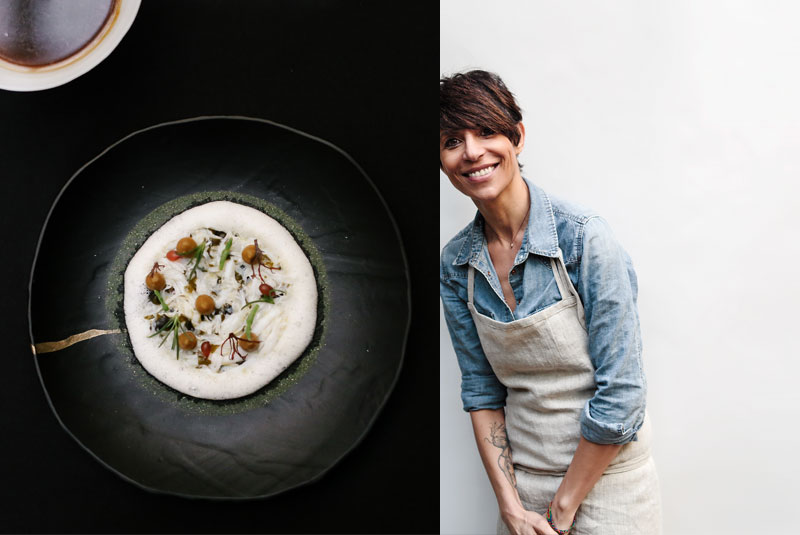
An Atelier Crenn dish and the Chef
RJ: Here in Harlem, they opened a Whole Foods, but when you go to buy something out of that Whole Foods, what you want doesn't exist. If you go 50 blocks down to 89th Street, they have all of it. What was the thought behind building this multi-million-dollar complex and promoting the fact that Whole Foods is coming to Harlem, and then not offering what you offer to the Upper West Side or Union Square? What's that about? They will fill their lobby full of beer manufacturers and crack cookie makers to dole out that crap to sell to the people, instead of having someone come in and try to explain to them that this fish is of high quality and this is the reason why you should eat it, and here are the health-smart things you should be eating, and here's how we're lowering prices to give you better quality... It's once again a big corporation taking advantage of a people of colour demographic. And it begs the question – who are the decision makers? The decision makers for these communities are not reflective of the communities themselves.
The media’s reaction and representation of Black-owned businesses and restaurants
DC: Food is at the centre of everything, it’s the core of society, and food is extremely political. We all need to come to the table, no matter who you are, and have an open conversation. Each of us needs to own their responsibility and it's not just about apologising. It’s about taking action and understanding others, not just putting up a list of African American owned businesses, but telling their stories, knowing who they are.
RJ: There's a farm we're planning to work with that is based in Pennsylvania – Bohlen Family Farms. It’s African American owned and they are growing some of the best vegetables I've seen on the East Coast. This is a small family farm that has an incredible story to tell. Urban farming also is something that we're sorely missing. It has been an ongoing conversation for quite a few years, but I don't see enough investment in it. I have invested in a small container farm company, Farm.One in Lower Manhattan, which is expanding. As an advocacy group, they are donating large swathes of their profits to Black Lives Matter programmes. Those are the type of people that we like to align ourselves with and I would like to see more of their stories told.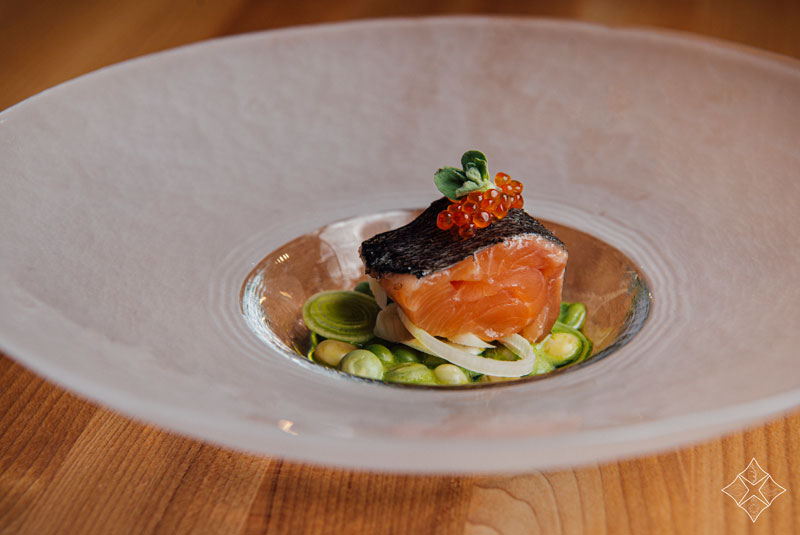
Big Bear – Jackson's dish from Reverence's fall menu, with hand-raised GreenWalk Hatchery California Rainbow Trout, house smoked roe, local leeks, Iacopi Farms cranberry beans and fresh wheat grass broth (image: Cassie Z.)
On the impact of African Americans on US food history
RJ: We've allowed people to whitewash and numb us to the fact that Black history isn't taught. People don't understand where their food comes from, who invented it. I talk all the time about Rufus Estes, the first African American cookbook writer [Good Things to Eat, 1911]. When you open that cookbook, it's not fried chicken and watermelon – it’s a French cookbook. He travelled along the East Coast and utilised local ingredients with French technique to create his food. Or take George Washington Carver, the Black man who invented over 300 peanut products. Ice cream exists in the United States because of Augustus Jackson, the Black White House chef for Dolly Madison. Lena Richards was the first on-air African American cooking show host, pre-Julia Child and Jacques Pépin, and she was enormously respected and popular. There is such a rich history and even as an African American, these are things that I was never taught.
The importance of diversity in kitchens
RJ: I'm proud of having a very inclusive kitchen. It's imperative that we have a multitude of voices and backgrounds. I lead the kitchen, I create the food, but I lean on the team so much to help and make the experience and the food better. I learned over time to allow their voices to come out and not contain, script or conscript the way they talk, think or act. Just allow them to be who they are. As they're growing and evolving, they're becoming these brilliant, talented people and because of that connection I have with them, they're learning more and they're teaching me more. The information exchange is so much better and for the guests; it resonates, they feel it.
DC: Don't hire someone who is African American or Black because you think it's the right thing to do. Hire them because you know that they are going to do a great job and they have an amazing voice. I always believed that the way the world needs to evolve is with diversity. Different voices bring amazing ideas, always. Let's not be silent and complicit anymore.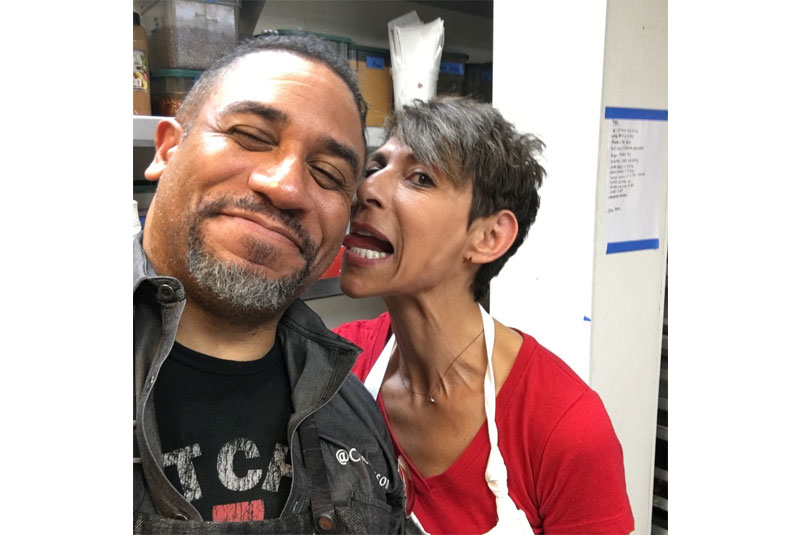
A moment from Jackson and Crenn's friendship
The historical significance of this period
RJ: Dom and I would both be pleased with life if all we had to do was just cook, serve and entertain people. But right now, it's so important for us to be able to stand behind the things that we truly believe, lean into them and push hard, because the time of reckoning is here. It's the vibration theory. You get to that place in life metaphysically where the vibrations, the intensity of it all, starts to rattle you and people are waking up to this stuff. In the past, we've just survived through it and pushed it away, but this is different. I don't think it's going to let up. I don't think that people are going to allow us to go back to the status quo of that existence.
DC: I was aware of a lot of the issues we're talking about but I turned my eyes away, thinking it was going to pass and that somebody else would be taking care of it. We have to take care of others and never turn away from someone who is in difficulty. With the pandemic, the industry came together because we are at the service of people and there is no discrimination, it doesn't matter where they come from, whether you're a homeless person or you live in a privileged area or you're a domestic violence victim or a medical worker. We were the first industry to get beat up by this pandemic, but we knew that our job was to bring food to others. This shows the humanity and the caring, but it can’t just happen during the pandemic, it needs to happen every day. We have an incredible opportunity. Food should never divide people; it should bring people together.
How the coronavirus pandemic is leading towards a more conscious restaurant industry
DC: The pandemic is changing the industry. People will go to restaurants and they won’t just look at the food, they will ask what is the company doing, what ‘right’ are they doing? Food is an act of activism. Spending your money is also an act of activism. The power you have in this world is about who you are as a person and what your purpose in life is. If you are a chef, you have a lot of responsibility. Ask yourself: what is your purpose? What is your story? How do you treat people? How do you treat the environment?
RJ: Our job is to be of service, to help people to be happy, healthy and walk with a soulful intent. When you come into mine or Dom’s restaurants and you dine, it's not just about ‘let me eat this block of protein and starch and carbohydrate and fuel myself’. It's not even only about the connections, the stories, the information or the ideas of the food. It’s about having a communal experience in a way that reconnects people not just to the food, but to each other. It's to have a deeper experience to be able to be open and loving.
Plotting a way forward
DC: This is a difficult time, a time of reflection, and a time to take responsibility and understand that we are a part of the problem, and then move forward and onward. Let's come together and see what the future looks like, but not the future in 20 years: the future is now. We need to make changes right now. But they need to be thought out, you need to understand why you're making those changes and really own it. Mental health is also very important to understand. So they need to be thoughtful, conscious and kind changes, and I don't think we should be afraid of calling people out, but we can call them out to hopefully bring them into the conversation.
RJ: All the history and the information are there, but restaurateurs and employers need to very clearly state what are the things they plan to change. Representation and diversity in kitchens are extremely important, and we need to talk about where money is being invested, and food quality. We need to get back to the staunch reality of making people healthy again. There are so many companies that are trying to pivot and show their support, and that's all wonderful and candid – it's great to post on Instagram or put up a commercial, but what are you really doing to systematically change? These things are going to take time and they're going to take people being consistent. But the only place that we can start from is within ourselves.
The interview has been edited for brevity and clarity.
Watch the full interview with Jackson and Crenn on our YouTube channel 50 Best TV, and subscribe for more videos:
On 4th June, 50 Best released a statement standing with the Black community against systemic racism and police brutality, and committed to running a regular series of features with Black writers, cooks, bartenders, and hospitality workers. We will also undertake research into issues of inclusivity within restaurant and bar businesses, which will help us plan a way forward. We are aware that the Black community has been hit disproportionately hard by coronavirus. This fact will continue to help shape the distribution of funds in our 50 Best for Recovery campaign. To read the full statement, click here, and discover our BLM resources here.
'50/50 is the new 50’ is a content series created by 50 Best and supported by S.Pellegrino with the shared aim of promoting equality, inclusivity and balance in the hospitality sector and beyond.
Follow 50 Best on Instagram @TheWorlds50Best, on Facebook @50BestRestaurants and on Twitter @TheWorlds50Best to stay up to date with the latest news.

